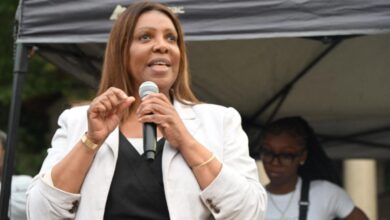Black voters NYC rejecting socialism and Zohran Mamdani

An infantilizing charlatan and quack—who owes a huge apology for attempting to pass himself off as African American.
That’s what black leaders are calling Democrat mayoral candidate Zohran Mamdani who, despite his airs of being “the great, brown hope,” continues to flounder with demographics his entire campaign is supposed to help.
Insiders say black voters are not warming up to the Democratic socialist since roundly rejecting him in June’s primary.
“He owes us an apology, for the community. How dare he?” Chantel Wright, a 59-year-old Harlem resident, bishop, and educator, told the Post in an impassioned interview.
Wright was referring to news last month that Mamdani – who is of Indian ancestry, but born in Uganda – lied on his application to Columbia University to get favored admissions treatment by claiming to be “African American.” She, like many black New Yorkers, hasn’t forgotten.
“When people use the cover of being African American—that is the most egregious, unacceptable, fraudulent, disingenuous action against our community I can even fathom.
“You don’t’ get to use the title of African American when it’s convenient for you.
“Whose seat did he take at that university? He took another black person’s seat. That could have been a first generation or second generation that was able to go to college,” Wright, a staunch supporter of Mayor Eric Adams, wonders.
“We don’t trust him.”
A Marist poll found that only eight percent of black New Yorkers support Mamdani–and it doesn’t seem to be improving.
In June’s Democratic primary Mamdani’s big boost came from white, gentrified Brooklyn and he also led by 20 points among New Yorkers earning over $100,000 — which hardly fits with his socialist agenda and image as a supporter of blue collar workers.
As the numbers suggest, the people most inspired by Mamdani’s big ideas are the ones who least need a leg up.
The 33-year-old candidate’s central message is “affordability,” but many New Yorkers wonder if the socialist candidate — who has rarely held a job for longer than a few months and lived with his parents almost into his 30s — really understands the needs and worldview of low-income wage-earners.
“I can tell you unequivocally that black voters are not socialist. Period,” Darius Jones, president of the National Black Empowerment Council, an Atlanta-based nonprofit, tells the Post.
“That notion of government being the savior of our people has proven, historically, to be antithetical to our drive for self-determination, our ability to create and pass down wealth generationally.”
Wright is more direct when asked about Mamdani’s Mamdani’s promise to lower the cost of living—which includes his plan for government run grocery stores, a rent freeze (but only for rent stabilized New Yorkers like himself), and free city buses
“Lies from the pit of Hell,” Wright shot back. “Don’t pee-pee on our leg and tell us that it’s raining.
“Because we know the difference. One thing our parents teach us as soon as we are cognizant is that nothing is free. You’re going to pay double for it in the back end.
“So, no, riding the bus for free might be something that looks cute to the younger generation who was raised on TikTok,” she says, “but the older folks I’m talking to are not buying it. It’s a smokescreen.”
There remains a sense in the black community that the Mamdani train has left the station without their input, as one NAACP chief pointed out recently, even as Mamdani launches a (belated and lackluster) effort to get them on board.
His team has now hired a fulltime staffer—Afua Atta-Mensah, a nonprofit boss who identifies herself on social media bios as a “she/her,” “savant,” and “Prosecco purist”—to expand his support in traditional black strongholds like Brownsville, East Flatbush, and Crown Heights.
Aside from Mamdani’s resume chasms and college application blackface, leaders in the black community are speaking out against the socialist takeover of the Democrat party—which Democratic Socialists of America member Mamdani is now the central figurehead for.
“It’s infantilizing to put out these notions that ‘we want to take over the means of production,’” says Jones, of one of Mamdani’s more outwardly Marxist talking points.
“People who are still espousing [government dependency] are showing how disconnected they are from black people—to think that those notions still carry favor in our community.”
He points to Mamdani’s advocacy to decriminalize all drugs and prostitution, as well as defunding the police, as “particularly damaging and often punitive to black families.”
“If you live in some of these fashionable areas of New York, notions like that might sound egalitarian, or novel. But if you’re actually a grandmother living in a community with high crime, what’s that going to do?”
Bishop Wright concurs, telling the Post: “New York doesn’t need an experiment right now. We’d be out of our minds.”
Jones believes such ideas are downright insulting.
“People underestimate the political sophistication of black people,” he says. “Black people see this as a vanity project—idealism that comes out of faculty lounges at NYU or Columbia,” the latter of which being where Mamdani’s father teaches; the family also lived close to campus in the college’s subsidized housing.
“It’s all great and fanciful for people who don’t have real connections to black people.”
Credit to Nypost AND Peoples



